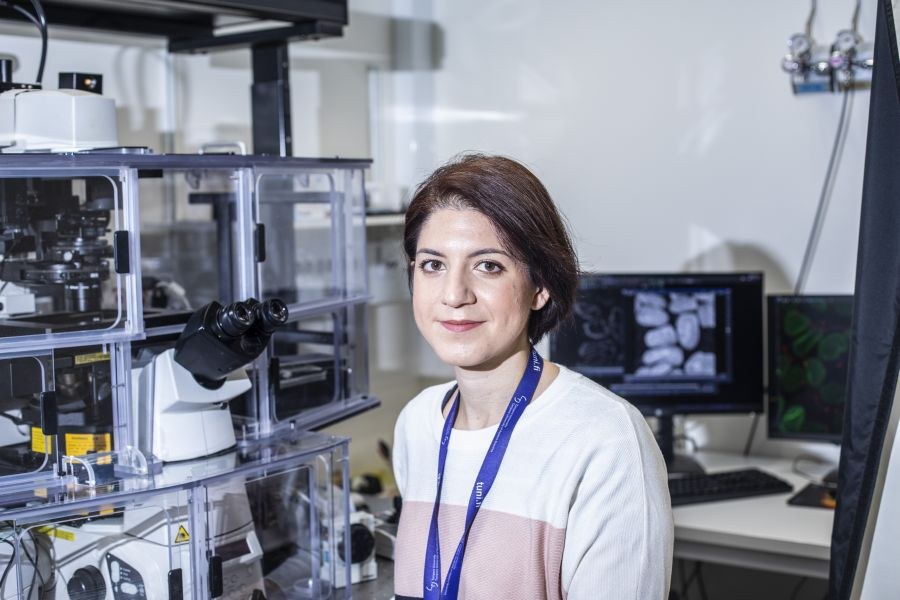Chiara Fedele harnesses her inventions to promote health

Chiara Fedele’s research goal is to create materials and devices that can respond to light and change the behavior of cells in a dynamic way.
“I am also interested in how these materials can be translated into real-world applications that can benefit society, and I enjoy exploring opportunities for innovation, entrepreneurship, and commercialization of research,” she says.
For Fedele, being a researcher means not only studying and understanding natural phenomena, but also providing the tools to concretely contribute to improving people’s lives.
“I chose to study materials engineering, because I found it to be particularly interesting and relevant to both scientific discovery and technological innovation. Since then, I have been collaborating with researchers from different backgrounds and disciplines, such as chemistry and biology, working on very multidisciplinary topics,” she says.
L-cell is an invention to enhance pharmaceutical R&D
In 2017, Chiara Fedele received her doctorate at the Italian Institute of Technology in the University of Naples “Federico II”, Italy. Her doctoral dissertation focused on developing photo-responsive biomaterials for smart cell culture applications.
Fedele came to Tampere University of Technology in 2017 to work as a postdoctoral researcher in the Smart Photonics Materials (SPM) research group led by Professor Arri Priimägi. The SPM team aims at exploiting the power of light to control functional soft materials. In her job Fedele collaborates also with colleagues from the field of health technology.
When developing a new drug, researchers usually test it by culturing human cells on plastic dishes. According to Fedele, this simplified system does not capture the complexity of the human body and can lead to inaccurate results and hide future drug failures. This means that the downsides of the drug being studied may not be seen until in later human or animal studies.
To resolve this problem the L-cell (Light-reconfigurable Substrates for Cell Cultures) team proposes integrating mechanobiology into the lab. Their solution is based on using smart light-controllable cell culture platforms. The project team is now preparing commercialization for using L-cell in pharmaceutical industry’s R&D purposes.
“L-cell solution enables us to study and manipulate cell behavior more precisely and effectively and may improve the quality of in vitro tests.”
In the long run, improving the drug discovery process can contribute to cost reduction of drug development and improve its sustainability.
Chiara Fedele
What is more, by providing better in vitro studies L-Cell may help to save money. Today, it costs nearly $2.5 billion to develop a new drug and the cost of failed drugs accounts for 60 % of the total drug development costs. In the long run, improving the drug discovery process can contribute to cost reduction of drug development and improve its sustainability, Fedele thinks.

A researcher passionate about innovation
Chiara Fedele says that she has always been curious about how things work and why they behave the way they do. In addition, she wants to make things better by improving existing processes to be more efficient.
However, she does not like to call herself an inventor.
“I prefer to think of myself as a researcher passionate about innovation, who enjoys discovering new ways of applying research results to real-world problems. Being an inventor, for me, means just changing perspective on my research and exploring new possibilities. I find anything that involves learning interesting, and I look forward to the future opportunities that this path will bring me,” she says.
By thinking out of the box and being persevering, you are already on the path to becoming a successful inventor!
Chiara Fedele
In her opinion, one of the characteristics of a good researcher or inventor is the ability to notice people's needs. Also, curiosity and critical thinking are useful to identify problems and to challenge existing solutions to find better ones.
“I think persistence is also important because one must keep trying to get funding and convince, for instance, investors and people from the industry to collaborate. These are all common traits in researchers. So, by thinking out of the box and being persevering, you are already on the path to becoming a successful inventor!”
Making world a better place by innovations
Inventions are products of human creativity that can transform society and shape the world. They have the potential to enhance our quality of life, increase our productivity, and enrich our experiences. In the best case, inventions help solve humanity's most critical challenges.
“My passion for inventing stems from my aspiration to make a positive difference in the world, whether through fundamental or applied research. I think inventions have a pragmatic aspect that allows them to have a tangible and direct impact on society, even if it might be smaller in scale,” Fedele says.
Fedele encourages all researchers considering whether their research could qualify as an invention, to explore the potential of invention disclosures and patents. They help researchers to protect intellectual property rights and bring ideas to life – and to the market. She wants to thank the university’s Innovation Services for valuable support in shaping the ideas to fit the market and in boosting motivation.
Finally, inventing requires money. Until now, the research conducted has been carried out with the help of European Research Council’s Proof-of-Concept project funding. The research has also received Research to Business project funding from Business Finland to cover the team’s work until February 2025.
Contact person
 Chiara Fedele
Chiara FedeleAuthor: Anna Aatinen







